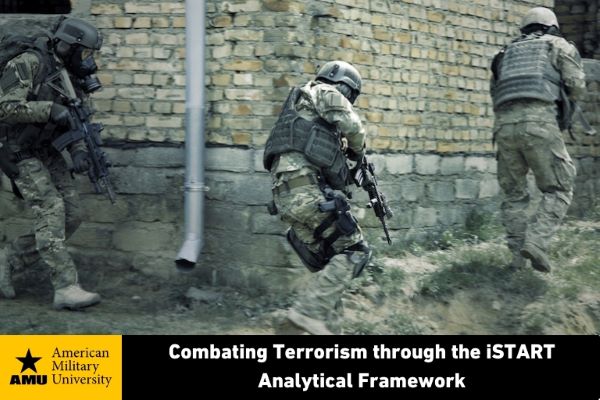By James Hess, Ph.D. | 07/10/2024

One of the greatest challenges for analysts is providing context. Intelligence and terrorism analysts, including international partners, must focus on how to interpret data to combat terrorism. In order to do that, they must understand that not all reporting is equal – data needs to be evaluated to ensure an accurate and meaningful analysis.
Analytical frameworks are a valuable way to analyze data. As data is put into the variables used for evaluation, the relationship between the variables is strengthened by the quality of the data, ensuring that the international community has a unified approach to combating terrorism.
After years of research and practice, I developed an analytical framework for counterterrorism analysis. This framework is called iSTART, and it can be used to understand how specific terrorist organizations operate. iSTART stands for:
- Ideology
- Strategy
- Tactics
- Accounting
- Recruitment
- Targets
Ideology
In his work, The Four Waves of Modern Terrorism, UCLA emeritus professor, David Rapoport reminds us that terrorism needs a doctrine, a culture, a raison d’affaire, defined ideals – in other words, an ideology. Ideology provides the reason, and it needs to be a powerful reason as it is asking for followers to be willing to die for it.
For example, the ideology of a terrorist group needs to be strong enough and motivating enough to inspire others. That inspiration, stemming from the ideology, leads followers to violent extremism to the point where followers are willing to kill others or to die for the cause.
Strategy
The strategy employed by terrorists is how they plan to implement the ideology. For example, ISIS is focused on replacing the beliefs of traditional Islam with its own interpretations. Declaring a caliphate (an Islamic state led by a caliph, who is considered the political and religious successor to the Prophet Muhammad) is the method (or in this case, the strategy) to enforce the group’s changes to Islam.
Tactics
Tactics are how a terrorist group meets its objective. The four waves of modern terrorism – the anarchist wave, the anti-colonial wave, the new left wave, and the religious wave – demonstrate how these tactics change according to ideology and circumstance.
For instance, the first wave of modern terrorism, the anarchist wave, used assassinations as its primary tactic. Today, foreign terrorist fighters use airplanes and improvised explosive devices (IEDs) to provoke mass destruction, along with the occasional assassination.
Accounting
Accounting (terrorism financing) is how terrorist groups equip themselves or function as an organization. The ideology of terrorists needs to be viable enough for would-be donors to provide funding.
However, not all organizations are fortunate enough to have independently wealthy members such as Osama bin Laden. Therefore, fundraising is an important function for most groups.
Recruiting
Recruiting is how a group develops its manpower. Again, ideology is a key part of recruiting.
Another powerful tool for recruiting is the use of new technologies. Terrorists from different countries have become quite tech-savvy and capable of developing significant recruiting efforts through social media groups and other internet sites.
Targets of Terrorist Groups
Terrorist groups develop targets that will advance their strategies. The third wave of modern terrorism is known as the “new left wave.”
Terrorist groups especially target symbols of capitalism and critical infrastructure through violent extremism. Terrorists also conduct or take responsibility for attacks they did not commit. Terrorist groups do that to remain relevant – that relevance often comes from conducting attacks to remain in domestic and international news.
International Cooperation and the Role of Regional Organizations
It is essential for analysts, including international peace organizations such as the United Nations, to evaluate all data to have more focused and accurate analyses of terrorist threats. The improved analysis leads to better counter terrorism strategies, improved efforts in fighting terrorism, and better ways to protect the public.
By utilizing an analytical framework such as iSTART, intelligence and terrorism analysts can provide those improved analyses. Cooperation is vital in creating a global counter terrorism strategy and combating international terrorism, as the threat posed by terrorists often transcends borders. Regional organizations also play a significant role in this collaborative effort, ensuring a unified response to terrorist threats within their jurisdictions.
Intelligence Degrees at American Military University
American Military University (AMU) offers several degree options for students interested in intelligence studies and global security. Courses in these programs are intended to equip students with the knowledge and skills needed to seek job opportunities in the U.S. Intelligence Community, national security, and organizations in both the public and private sectors.
These degrees include:
- An online bachelor’s degree in intelligence studies
- An online master’s degree in intelligence studies
- An online doctoral degree in strategic intelligence
- An online doctoral degree in global security
Key areas of study for these degree programs include:
- Intelligence analysis
- National and international intelligence operations
- Collection methods
- Advanced research methods
- Counterintelligence
- International relations
- Law and ethics
- Critical analysis
- Threat analysis
- Intelligence collection and operations
- Homeland security
- Terrorism studies
- Strategic intelligence theories
- Qualitative and quantitative research methods
- Strategic leadership practices
Faculty members bring practical experience from roles in intelligence, government, and the military. For more information about these degree programs, visit our program page.

Dr. James Hess is a professor of intelligence and terrorism studies with American Military University. He holds an associate degree in intelligence operations studies from Cochise College, a bachelor’s degree in general studies from Northwestern State University, and a master’s degree in liberal arts from Louisiana State University.
Dr. Hess also earned a Ph.D. from Louisiana State University, where he studied improving analytical methodologies in counterinsurgency and counter-terrorism environments. He is also a fellow and affiliated faculty with the University of Arizona’s Center for Middle Eastern Studies where he researches Islamic jurisprudence and its impact on terrorism.

